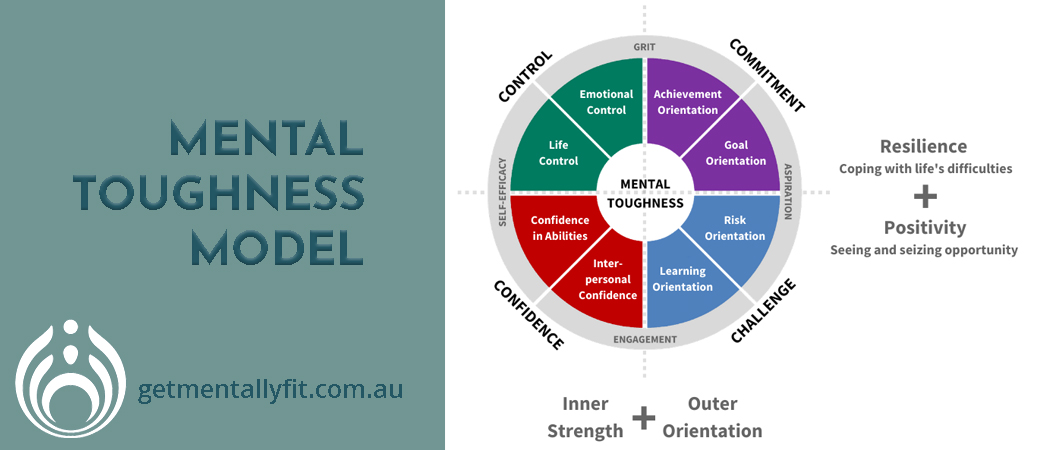Managing stress, pressure and life challenges
No matter your ambitions in life, mental toughness is an extremely valuable quality that can hold massive influence over your level of success and quality of life.
Developing mental toughness will help you to deal with stress, pressure and life challenges. This will help you to perform better professionally while enjoying a more satisfying home-life.
And the really good news is, you can develop mental toughness!
What are the 4C’s of Mental Toughness?
1 Challenge: How much do you see challenge as an opportunity?
2 Confidence: What is your level of self-belief?
3 Commitment: What’s your ability to stick to tasks?
4 Control: How much do you believe that you control your destiny?
Take the first step – develop Mental Toughness
Get Mentally Fit’s, Principal Psychologist, Emily Johnson is an accredited facilitator of AQR’s MTQ-Plus questionnaire, which she administers and debriefs via our Measure Your Mental Fitness service.
The measure takes 10-15 minutes and the resulting MTQ Report is easy to understand. Contact us to enquire into undertaking the pro-active step of reliably measuring your current mental toughness

The First C of Mental Toughness: Challenge – the important element of drive
Here, our description of “challenge” represents any activity or event which is considered out of the ordinary and involves doing something that is stretching. A common one is public speaking or going for a promotion at work.
An individual’s attitude towards challenge can be reliably scaled between two responses. Challenges can be seen as:
1 A threat, an uncomfortable step into the unknown and something to be avoided if possible.
2 Exciting and interesting and something that offers the opportunity for learning and for personal development.
Having experienced a challenge, the mentally tough Individual thinks: ‘That may not have worked but I have learnt something valuable for doing it. I will know how to do it better next time’. On the other hand, the mentally sensitive individual thinks: ‘That didn’t work. That was unpleasant. I won’t do that again’.
A critical difference here between the mentally tough and mentally sensitive individual is that the mentally tough gained a positive learning experience through the challenge while the mentally sensitive’s perspective contributed to a negative learning experience. The initial negativity toward a challenge has now become a negative experience for the mentally sensitive individual. This can contribute to the avoidance of future challenges which are not only an inevitability in life, but a fantastic opportunity for growth and drive.
The Second C of Mental Toughness: Confidence – an individual’s ‘self-belief’
Confidence represents the inner strength to stand your ground when experiencing challenges that might present a setback upon failure. These setbacks could be physical, like a life-changing injury. Or they may also be mental or verbal (like a criticism).
Confidence is categorised into two key sub-factors.
1 Confidence in one’s ability or self-esteem. An example is a belief that you have the intellectual toolkit (it may be knowledge, skills, education, and experience) to attempt and to complete a particular task.
2 Interpersonal confidence or assertiveness. An example is having the ability to hold your ground when you know you are right to do so in the face of alternative views expressed by others who could derail your presentation or project.
The mentally tough individual accepts that setbacks are a part of everyday life. They take these setbacks in their stride and continue with even greater determination. The mentally sensitive individual meanwhile, is more likely to feel defeated by the very same situation and setback. Unfortunately, this prevents them from achieving a goal or task. They are more likely to feel that they have given it their best shot and consequently give up.
Further: this may prevent the mentally sensitive from ever taking on any situation that requires self-esteem or assertiveness, and they withdraw from work, social scenarios or maybe even what they consider to be challenging family scenarios.
The Third C of Mental Toughness: Commitment – how an individual sees ‘goals and targets’
Commitment refers to the extent to which we make promises – particularly those which are tangible and measurable – and the commitment we place on keeping those promises. These promises could be related to work projects, family goals – like visiting an ailing relative, or commitment to personal targets like a New Year’s resolution.
We are often judged in terms of our reliability – ‘I can trust him or her to do that’. This can also apply to promises that we make to ourselves.
The mentally tough individual will break things down into manageable chunks. They diligently maintain focus, have a strong sense of conscientiousness, and like to celebrate the success of their own commitment and that of others. The mentally sensitive individual meanwhile, is sometimes intimidated by goals and measures. This is exhibited in skipping meetings at work or classes at school; this is essentially self-sabotage to defer from commitment to a goal in fear of failure.
The Fourth C of Mental Toughness – Control – the ability to ‘shape and influence’
Our final C of mental toughness, control, is the extent to which people feel they are in control of their life.
The influence of the concept of control is well understood in light of stress management and the state of peak performance. Studies consistently show that the less people feel they are in control, the more likely they are to feel more stressed in a way that leads to negative consequences.
Control is categorised into two key sub-factors.
1 Life control or self-worth. This is the extent to which we believe we shape what happens to us versus how external factors affect us.
2 Emotional control. This is the extent to which we control our anxieties and or emotions and reveal our emotional states, either positive or negative, to others.
The mentally tough: only reveal emotions and feelings that they want to show. They are good at controlling emotions, and they stay calm in a crisis. On the other hand, the mentally sensitive: let everyone know exactly how they are feeling, internalise problems and the feelings that arise from them, and they often think ‘I don’t deserve this’ when issues affect them.
How Do We Measure the 4 C’s of Mental Toughness – and Why?
Thanks to 30 years of work by Doug Strycharczyk, Peter Clough, and their colleagues, a valid and reliable way of measuring mental toughness is readily available.
The MTQ-Plus questionnaire – an online psychometric measure – has been found to be a particularly effective vehicle for measuring an individual’s ability to manage pressure and cope with challenging situations.
The MTQ-Plus measure and the Mental Toughness Model, are currently widely used in the context of work, education, health, sports – and most recently, in social applications. The importance of measuring mental toughness is to help individuals to know their personality and ways to improve resilience to pressure, stress and life challenges.


